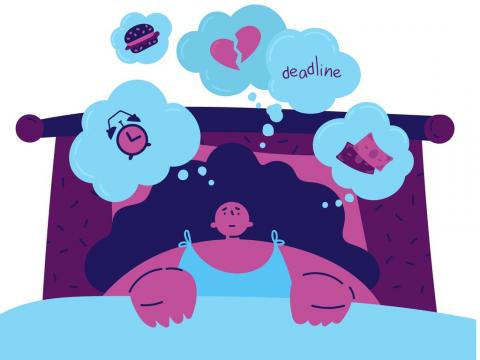3 Ways to Ensure Quality Rest

When you're working from home it can be hard managing your time in terms of rest and wellbeing.
In September 2020 the Government released a report ‘COVID-19: mental health and wellbeing surveillance’. The evidence has shown that mental health and wellbeing has worsened during the COVID-19 pandemic, which is not surprising when thinking about the uncertainty and anxiety that has arisen during this time. The changing lockdown rules and what tier you are situated in, have added to uncertainty. A key finding in this report is that Black, Asian and Minority Ethnic communities reported a larger deterioration in mental health than white British communities.
With the effects of the pandemic ongoing, rest and wellbeing needs to be prioritised, especially for people of colour. Rest is supposed to be something you actively do, however this is often approached passively. While rest is natural to us there are a few practical things we can do to ensure that we properly rest up this spring:
- Get access to sunlight
Natural sunlight is proven to provide health and wellbeing benefits. Alongside helping you cope if you struggle with seasonal depression and supporting you sleep better, it also helps your skin absorb Vitamin D.
The pandemic has increased awareness about how important Vitamin D is; it is a crucial nutrient that reduces the risk of bone loss and heart disease. Just 30 minutes of natural sunlight a day can also help improve sleep and can protect against acute respiratory infections (according to Sleepstation, a clinically validated sleep improvement service).
If you’re trying to get outdoors more to get your fill of natural light, we recommend you check out our new resources on nature and adventure outdoors.
- Stick to a routine
While staying in bed is tempting, over-sleeping can reduce the quality of sleep you have. 8-hours of sleep is generally recommended, and staying in bed for longer can leave you feeling even more sluggish and tired during the day.
It is essential that you train your body to sleep and rise around the same time. One of the ways you can do that is to maintain a routine for what time you go to sleep and wake up. Push through the urge to stay in bed and avoid oversleeping!
If you struggle with maintaining a routine when it comes to sleep, check out:
- Sleepstation: sleep improvement and insomnia courses
- Sleep Council: advice, tools & online resource hub
- Mind: tips to improve your sleep
- Try techniques to tackle overthinking
At times we can try to physically rest, yet our mind will be going 100 miles per hour. A big disruption to both rest and wellbeing is over thinking. Everyone responds differently to stressful situations, and a pandemic is definitely a stressful situation!
It’s normal to find yourself anxious or worried during a year like this. There has been a lot of change and uncertainty, and there is a lot to think about from work and finances to family and friends.
If you’re finding yourself having thoughts that keep you up at night, learning how to properly combat these intrusive thoughts is key to having a fulfilling rest. There are Techniques such
- Think about or write down three small things you are grateful for
- Try to picture your happy place and take your mind there - where is it? What does it look like? How do you feel when you’re there?
- Repeat a word or do a mental puzzle to distracting yourself
Find out more about these techniques and others that are shown to help with overthinking this Sleepstation article. These things do take practice, but will be very useful in the long run.
If you're feeling concerned about your lack of sleep, and feel that you're able to get appropriate rest it may be a good idea to notify your GP. However, it could also be connected to stress and mental health, in this case Spark and Co.'s Resource Directory offers an extensive range of mental health support services and networks.
This post was written by one of our Community Ambassadors, founder of A Touch of Colour, Leonie Mills.
